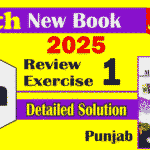MCQs Chapter1 Real Numbers
We will solve MCQs Chapter1 Real Numbers class 9 math with full explanation. The Post belongs to Review exercise 1 question 1 Math class 9. Multiple choice questions is an important section of class 9 math’s paper. We will check properties of equality and inequality of real numbers and different types of surds ?
————————————————————————-
Four options are given against each statement. Encircle the correct option.
i:-$$\sqrt7\;is$$
(a) integer (b) rational number (c) irrational number (d) natural number
$$\sqrt7\;is\;an\;irrational\;number$$
option c is correct.
7 is not a complete square.
————————————————————————-
ii:-$$\mathrm\pi\;\mathrm{and}\;\mathrm e\;\mathrm{are}$$
(a) natural numbers (b) integers (c) rational numbers (d) irrational numbers
$$\mathrm\pi\;\mathrm{and}\;\mathrm e\;\mathrm{are}\;\mathrm{irrational}\;\mathrm{numbers}$$
option d is correct.
$$\mathrm\pi\;=\;3.1416……………..\\\mathrm e\;=\;2.718281…………..\\\\\mathrm\pi\;\mathrm{and}\;\mathrm e\;\mathrm{are}\\\mathrm{non}\;\mathrm{repeating}\\\mathrm{and}\;\mathrm{non}\;\mathrm{terminating}\\\mathrm{decimal}\;\mathrm{numbers}\\$$
————————————————————————-
iii:-$$If\;n\;is\;not\;a\;perfct\;square,\\then\;\sqrt n\;is$$
(a) rational number (b) natural number (c) integer (d) irrational number
$$\sqrt n\;is\;an\;irrational\;number\;if\\n\;is\;not\;a\;perfect\;square$$
option d is correct.
$$\sqrt9\;is\;rational,\;9\;is\;perfect\;square.\\\sqrt7\;is\;irrational,\;7\;is\;not\;perfect\;square.\\$$
————————————————————————-
iv:-$$\sqrt3+\sqrt5\;is$$
(a) whole number (b) integer (c) rational number (d) irrational number
$$\sqrt3+\sqrt5\;is\;an\;irrational\;number$$
option d is correct
$$Sum\;of\;two\;rational\;numbers\;is\;a\\rational\;number.\;\sqrt3\;is\;a\;rational\\number.\;\sqrt5\;is\;a\;rational\;number.\\\sqrt3\;+\sqrt5\;is\;also\;a\;rational\;number.\\$$
————————————————————————-
v:-$$For\;all\;x\in\mathbb{R},\;x=x\;is\;called$$
(a) reflexive property (b) transitive number (c) symmetric property (d) trichotomy property
$$For\;all\;x\in\mathbb{R},\;x=x\;is\;called\\Reflexive\;property$$
option c is correct.
Every number is reflection of itself. 3 is reflection of 3, 4 is reflection of 4 and x is reflection of x.
————————————————————————-
vi:-$$Let\;a,b,c\;\in\mathbb{R},\;then\\a>b\;and\;b>c$$
$$\Rightarrow\;a>c\;is\;called$$
(a) trichotomy property (b) transitive property (c) additive property (d) multiplicative property
$$a>b\;and\;b>c\;\Rightarrow\;a>c\\is\;called\;transitive\;property$$
option b is correct
3 > 2 and 2 > 1 implies that 3 > 1
————————————————————————-
vii:-$$2^x\;\times\;8^x\;=\;64\;then\;x=$$
(a) 3/2 (b) 3/4 (c) 5/6 (d) 2/3
$$\;x=\frac32$$
option a is correct.
$$2^x\;\times\;8^x\;=\;64\\\\2^x\;\times\;{(2^3)}^x\;=\;2^6\\\\Rule\;of\;power\;of\;power\\\\2^x\;\times\;2^{3x}\;=\;2^6\\\\In\;multiplication\;Base\;same,\;powers\;add\\\\2^{x+3x}\;=\;2^6\\\\In\;equality,\;Base\;same,\;Powers\;same\\\\\Rightarrow\;x\;+\;3x\;=\;6\\\\4x\;=\;6\\\\x\;=\;\frac64\;=\;\frac32$$
————————————————————————-
viii:-$$Let\;a,b\;\in\mathbb{R},\;then\;a=b\\\;and\;b=a\;is\;called$$
(a) reflexive property (b) symmetric property (c) transitive property (d) additive property
$$a=b\;and\;b=a\;is\;called\;symmetric\;property$$
option b is correct.
Symmetric not reflexive, a and b are different, a=a means reflection.
————————————————————————-
ix:-$$\sqrt{75}\;+\;\sqrt{27}\;=$$
$$(a)\;\sqrt{102}\;\;\;(b)\;\;9\sqrt3\;\;\;(c)\;\;5\sqrt3\;\;\;(d)\;\;8\sqrt3$$
option d is correct.
$$\sqrt{75}\;+\;\sqrt{27}\;=\;5\sqrt3\;+\;3\sqrt3\;=\;8\sqrt3$$
————————————————————————-
x:-$$The\;product\;of\\(\;3+\sqrt5\;)\;(\;\;3-\sqrt5\;)\;is$$
(a) prime number (b) odd number (c) irrational number (d) rational number
$$(\;3+\sqrt5\;)\;(\;\;3-\sqrt5\;)\;is\;a\;rational\;number\\$$
option d is correct.
Product of irrational numbers may be rational or irrational number.
$$\;3+\sqrt5\;is\;irrational.\;\;3-\sqrt5\;is\;irrational\\\\(\;3+\sqrt5\;)\;(\;3-\sqrt5\;)\;=\;3^2\;-\;{(\sqrt5)}^2\\\\=\;9\;-\;5\;=\;4\\\\4\;is\;rational\;\Rightarrow(\;3+\sqrt5\;)\;(\;3-\sqrt5\;)\;is\;rational.$$
————————————————————————-
Important links are given below. Best of luck for your bright future. If you find any mistake, correction will be welcomed. Any suggestion will also be welcomed.
————————————————————————-




